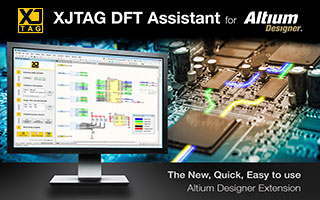Key points:
- New easy to use Design For Test (DFT) tool for Altium Designer
- Free extension available to all Altium Designer users
- Avoid costly re-spins by catching errors at the design stage
- Find errors in a boundary scan chain before producing any hardware
- Harness the full power of boundary scan to improve testability
Cambridge, England, February 18, 2016 — XJTAG®, a world leading supplier of boundary scan technology, will officially launch the XJTAG DFT Assistant for Altium Designer® at Embedded World 2016, Nuremberg, Germany (Feb 23-25, Hall 4 Stand 4-641). Developed by XJTAG, the free software extension for Altium Designer significantly increases the Design for Test capabilities of the unified schematic capture and PCB design system.
Modern printed circuit boards (PCBs) are increasingly densely populated and access to pins under many packages, such as Ball Grid Array (BGA) or Land Grid Array (LGA), is virtually impossible. This is a major challenge for any test equipment that relies on physical contact to a node or pin. As boundary scan was designed to be the practical solution to this challenge, it has become vitally important to get the boundary scan chain right at the design stage. XJTAG DFT Assistant for Altium Designer helps validate correct boundary scan chain connectivity, through full integration with Altium Designer.
“The XJTAG DFT Assistant for Altium Designer provides engineers with a free, easy to use extension to check if boundary scan chains are correctly connected and terminated at the schematic capture stage, long before the PCB is produced. By detecting and correcting these faults earlier, companies do save both time and money.” commented Simon Payne, CEO, XJTAG. “While the first prototype is being manufactured, XJTAG DFT Assistant allows you to export a preliminary XJTAG project from Altium Designer to the XJTAG development software, where additional tests can be developed. These can then be used to test real hardware, as soon as it’s available. This provides a vital new capability to electronic engineers everywhere.”
The XJTAG DFT Assistant for Altium Designer comprises two key elements; the XJTAG Chain Checker, and the XJTAG Access Viewer.
XJTAG Chain Checker identifies common errors in a JTAG scan chain, such as incorrectly connected Test Access Ports (TAPs). A single connection error would inhibit an entire scan chain from working, XJTAG Chain Checker identifies connection errors and reports them to the developer during the design process. Incorrectly terminated TAPs are also identified.
XJTAG Access Viewer overlays the extent of boundary scan access onto the schematic diagram, allowing users to instantly see which components are accessible using boundary scan, and where test coverage could be further extended.
“We are delighted that XJTAG is introducing this extension, which we believe our customers will find extremely beneficial in their product development,” said Daniel Fernsebner, Corporate Director, Technology Partnerships and Business Development, Altium. “As a specialist in boundary scan technology, XJTAG has a wealth of experience in solving PCB issues that can inhibit a boundary scan chain from working correctly. By applying this knowledge to XJTAG DFT Assistant for Altium Designer at the schematic capture stage, engineers can now benefit from this experience from within our design environment and before any hardware is produced.”
Boundary scan, as defined by the IEEE 1149.x family of standards and adopted by all leading semiconductor manufacturers, provides electrical access to compliant integrated components on a PCB using a boundary scan chain; a simple 4- or 5-signal bus that sequentially connects JTAG-enabled devices. Through boundary scan, access can be further extended to include non JTAG-enabled devices for connectivity and functional testing, as well as non-volatile memory and FPGA/CPLD programming.
Useful from prototype bring-up to production test, boundary scan allows a wide range of faults to be detected, such as short circuits, open circuits, stuck-at high/low faults and missing pull-up/down resistors. XJTAG’s products also allow faults to be located to specific nets, without the need for physical access to pins or expensive In-Circuit Testers, Flying Probe or Bed-of Nail test fixtures.
XJTAG DFT Assistant for Altium Designer is a free extension downloadable from the Extensions panel.
To find out more, visit www.xjtag.com or contact us at enquiries@xjtag.com.
Media contact: Philip Ling, Technical Marketing Manager, XJTAG (philip.ling@xjtag.com).
About XJTAG (www.xjtag.com)
XJTAG is a world leading supplier of JTAG boundary-scan hardware and software tools. The company focuses on innovative product development and high quality technical support. XJTAG products use IEEE Std.1149.x (JTAG boundary-scan) to enable engineers to debug, test and program electronic circuits quickly and easily. This can significantly shorten the electronic design, development and manufacturing processes.
XJTAG is based in Cambridge, UK, with clients including ARM, CSR, Eaton, Imagination Technologies, Saab and Thales, across a wide range of industries such as aerospace, automotive, defence, medical, manufacturing, networking and telecommunications. The company has over 70 case studies available, covering the sales and support of its products worldwide working closely with over 50 experienced and professional distributors and technology partners across the globe. XJTAG is part of the Cambridge Technology Group.
About Altium (www.altium.com)
Altium Limited (ASX: ALU) is a multinational software corporation headquartered in San Diego, California, that focuses on electronics design systems for 3D PCB design and embedded system development. Altium products are found everywhere from world leading electronic design teams to the grassroots electronic design community.
With a unique range of technologies Altium helps organisations and design communities to innovate, collaborate and create connected products while remaining on-time and on-budget. Products provided are Altium Designer®, Altium Vault®, CircuitStudio®, PCBWorks®, CircuitMaker®, Octopart® and the TASKING® range of embedded software compilers.
Founded in 1985, Altium has offices worldwide, with US locations in San Diego, Boston and New York City, European locations in Karlsruhe, Amersfoort, Kiev and Zug and Asia-Pacific locations in Shanghai, Tokyo and Sydney. For more information, visit www.altium.com. You can also follow and engage with Altium via Facebook, Twitter and YouTube.
Image (click for high resolution)
XJTAG® Announces Free DFT Extension for Altium Designer®




